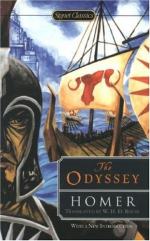While, however, I look upon the belief in Homer as one that has nature herself for its mainspring; while I can join with old Ennius in believing in Homer as the ghost, who, like some patron saint, hovers round the bed of the poet, and even bestows rare gifts from that wealth of imagination which a host of imitators could not exhaust,—still I am far from wishing to deny that the author of these great poems found a rich fund of tradition, a well-stocked mythical storehouse, from whence he might derive both subject and embellishment. But it is one thing to use existing romances in the embellishment of a poem, another to patch up the poem itself from such materials. What consistency of style and execution can be hoped for from such an attempt? or, rather, what bad taste and tedium will not be the infallible result?
A blending of popular legends, and a free use of the songs of other bards, are features perfectly consistent with poetical originality. In fact, the most original writer is still drawing upon outward impressions—nay, even his own thoughts are a kind of secondary agents which support and feed the impulses of imagination. But unless there be some grand pervading principle—some invisible, yet most distinctly stamped archetypus of the great whole, a poem like the Iliad can never come to the birth. Traditions the most picturesque, episodes the most pathetic, local associations teeming with the thoughts of gods and great men, may crowd in one mighty vision, or reveal themselves in more substantial forms to the mind of the poet; but, except the power to create a grand whole, to which these shall be but as details and embellishments, be present, we shall have nought but a scrap-book, a parterre filled with flowers and weeds strangling each other in their wild redundancy; we shall have a cento of rags and tatters, which will require little acuteness to detect.
Sensible as I am of the difficulty of disproving a negative, and aware as I must be of the weighty grounds there are for opposing my belief, it still seems to me that the Homeric question is one that is reserved for a higher criticism than it has often obtained. We are not by nature intended to know all things; still less, to compass the powers by which the greatest blessings of life have been placed at our disposal. Were faith no virtue, then we might indeed wonder why




